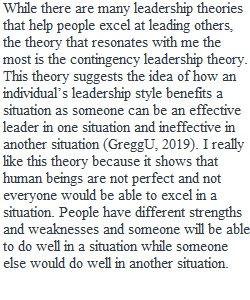


Q During the first week of this course, you familiarized yourself with your discipline's ethical code and some of the issues in your own and other disciplines. Ethical issues are complex and multi-faceted, often impacting multiple disciplines besides your own. This course is one way in which we can start to break down silos across disciplines, as well as silos that exist across stakeholder groups in society. We want these discussions to serve as forums for you to support one another and share insights. All posts are due by the end of the week. However, the earlier in the week you post, the more points you will get in the discussion rubric. For example, while you can post at any time of the week that works for you, if you post by Wednesday, you will earn full points on the timeliness criterion. For each day later in the week that you post, you will earn fewer points. Per Excelsior policy, no posts are accepted for grading after the module closes. Please view your rubric for specific information on maximizing your points.?If you have questions, please ask me! Part I: Initial Post Over this term, you will be developing your leadership skills, using an ethical lens. During the first week, you explored several leadership theories through your readings and videos and have become familiar with your discipline’s code of ethics. This will be a two-pronged discussion. • First, share which leadership theory resonates with you and why. Is there a leadership theory with which you are particularly uncomfortable? How so? • Next, let’s examine a scenario through the lens of your chosen leadership theory and your discipline’s ethical code. Read the scenario and share what you would do in this leader’s position. You are a director-level leader in an organization. All of your employees have recently returned to the office for a full five-day work week. As supervisor for 20 people, you sign off on timesheets in a payroll management system. Over the past several months, you have noticed that several people seem to be taking lunches that are longer than the allotted half hour and seem to be gone just before the end of the workday. Yet time sheets reflect the expected attendance. As a compassionate leader, you do not want to make a big deal. You know that several of your employees are struggling with reliable childcare, and one is caring for an aging parent with dementia. Yet, you are very uncomfortable with this situation and know that you need to address it. • Would you view this as unethical behavior, or as morally necessary “survival” behavior? How so? • How would you leverage your preferred leadership theory and your discipline’s code of ethics to respond to the situation? What questions might you ask? What would your response be? Part II: Interact with Classmates • Please meaningfully engage with at least two classmates to move the conversation forward. Share insights about what they said, ask questions, share experiences, etc. Be sure that you are responding to classmates from different disciplines, and ideally someone from your own discipline. This will help you to grow within your own discipline and as an interdisciplinary professional. Also, consider this essential question of morality versus ethics in your conversations. This is an issue you will confront often in your careers. • Actively monitor your own discussion thread throughout the week and respond as appropriate. Evaluation Discussions are worth 20% of your final grade. It is important that you read the latest Discussion Rubric below and the Discussion Guidelines. These documents lay out the requirements of the discussion and how you will be evaluated. References
View Related Questions